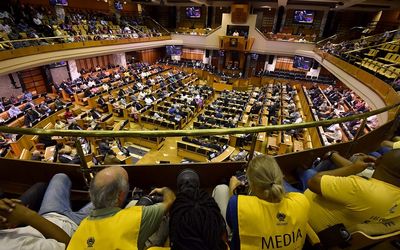BEE MATTERS: Is transformation behind economic growth setback?
by Gideon Gerber,
2016-02-24 05:49:08.0
IN THE current economic climate, everyone’s focus is on preventing a further rating downgrade, and all resources are being channelled into this.
The government, which up until now regarded itself as the only policy maker in the room, has been forced to put its tail ever so slightly between its legs and join hands with the private sector to get SA out of its economic tangle.
This suggests that the government could refrain from putting too much fuel behind sensitive policies, such as transformation. The irony is that transformation, which was conceived in 2002 as part of the Black Economic Empowerment (BEE) Commission’s policy framework, was identified as a central growth model.
This model was to be implemented to create more businesses, train more people, create jobs and allow excluded sections of the society to be taken up in the mainstream of economic activity. It was later hijacked for political and populist purposes as an instrument for so-called redistribution of the economy, but the original idea of transformation was and still is a good one.
It is not about taking a business from Paul to give it to Peter, but rather using Paul’s expertise to assist Peter to grow his own business. For this reason, the BEE scorecard measures the skills development of black people, the extent to which small black businesses are assisted, and whether a company provides a market for small businesses.
What is also needed is leadership to galvanise a social pact between the government, labour and business — similar to Codesa in the run-up to a democratic SA. We have the recipe, but whether we have the necessary leadership skills to do it again remains to be seen.
Listening to members of Parliament, and other policy makers who speak about fixing the economy, does not fill me with confidence. The matter of equality now appears to be very much on the back burner. It is as if the silence is an acknowledgement that transformation cannot coexist with endeavours to find solutions to our economic woes.
It suggests that there can only be the one or the other, and some might believe that the one can only exist at the expense of the other.
The question arises whether it is possible for transformation and growth to be mentioned in the same breath, or is transformation a reason we find ourselves in an economic predicament?
Whatever the answer, there is little doubt that the state is in more than a spot of bother financially. This is a drag on growth and on the private sector.
The government’s immediate response is regrettably not a strategy for effective new business growth and job creation. Its response is to see what it can scrabble together in the shortest possible time — increase taxes and introduce austerity measures.
Reducing the size of foreign travel delegations and having one capital city will not be nearly enough. Meaningful austerity measures would require piercing a large pin into the ever-ballooning government payroll.
Other meaningful areas that need to be addressed to rein in state expenditure are the size of the Cabinet and the continuing wastage as a result of corruption and poorly run parastatals. Taxpayers cannot afford to fund the league of parastatals queuing up with begging bowls.
Yet the government is yet again looking to business to prop up the parastatals and feed the bill of higher taxes. Increasing taxes without plugging the ever-gaping holes will deal a killer blow to the economy. If we want to grow the economy, we have to create more jobs and establish more businesses.
To achieve this, the government will have to admit that it cannot compete with the private sector on running businesses. It does not have the entrepreneurial skills or ability to do so.
Meaningful growth cannot be achieved by the government; it can be achieved only by the private sector with the assistance of the government. The private sector in is sitting on more than R1-trillion in cash. It can only find its way into the economy if an environment for growth is created by the government. Achieving growth will enhance the tax base, which in turn will alleviate pressure on the fiscus and create income for the poor.
The longer the government takes to get its house in order, with policy contradictions and uncertainties prevailing, the longer this cash will remain in fixed deposits as security and reserves.
These reserves need to be unlocked to create growth, but no business owner in their right mind will risk their cash reserves without a degree of certainty that capital investment will yield returns in the long term.
• Gerber is an attorney and the founder and Director of Serr Synergy, specialising in BEE structuring and compliance

The government needs to act urgently on policy contradictions and uncertainties to create a suitable environment for the private sector to invest more than R1-trillion in cash reserves. Picture: GCIS
IN THE current economic climate, everyone’s focus is on preventing a further rating downgrade, and all resources are being channelled into this.
The government, which up until now regarded itself as the only policy maker in the room, has been forced to put its tail ever so slightly between its legs and join hands with the private sector to get SA out of its economic tangle.
This suggests that the government could refrain from putting too much fuel behind sensitive policies, such as transformation. The irony is that transformation, which was conceived in 2002 as part of the Black Economic Empowerment (BEE) Commission’s policy framework, was identified as a central growth model.
This model was to be implemented to create more businesses, train more people, create jobs and allow excluded sections of the society to be taken up in the mainstream of economic activity. It was later hijacked for political and populist purposes as an instrument for so-called redistribution of the economy, but the original idea of transformation was and still is a good one.
It is not about taking a business from Paul to give it to Peter, but rather using Paul’s expertise to assist Peter to grow his own business. For this reason, the BEE scorecard measures the skills development of black people, the extent to which small black businesses are assisted, and whether a company provides a market for small businesses.
What is also needed is leadership to galvanise a social pact between the government, labour and business — similar to Codesa in the run-up to a democratic SA. We have the recipe, but whether we have the necessary leadership skills to do it again remains to be seen.
Listening to members of Parliament, and other policy makers who speak about fixing the economy, does not fill me with confidence. The matter of equality now appears to be very much on the back burner. It is as if the silence is an acknowledgement that transformation cannot coexist with endeavours to find solutions to our economic woes.
It suggests that there can only be the one or the other, and some might believe that the one can only exist at the expense of the other.
The question arises whether it is possible for transformation and growth to be mentioned in the same breath, or is transformation a reason we find ourselves in an economic predicament?
Whatever the answer, there is little doubt that the state is in more than a spot of bother financially. This is a drag on growth and on the private sector.
The government’s immediate response is regrettably not a strategy for effective new business growth and job creation. Its response is to see what it can scrabble together in the shortest possible time — increase taxes and introduce austerity measures.
Reducing the size of foreign travel delegations and having one capital city will not be nearly enough. Meaningful austerity measures would require piercing a large pin into the ever-ballooning government payroll.
Other meaningful areas that need to be addressed to rein in state expenditure are the size of the Cabinet and the continuing wastage as a result of corruption and poorly run parastatals. Taxpayers cannot afford to fund the league of parastatals queuing up with begging bowls.
Yet the government is yet again looking to business to prop up the parastatals and feed the bill of higher taxes. Increasing taxes without plugging the ever-gaping holes will deal a killer blow to the economy. If we want to grow the economy, we have to create more jobs and establish more businesses.
To achieve this, the government will have to admit that it cannot compete with the private sector on running businesses. It does not have the entrepreneurial skills or ability to do so.
Meaningful growth cannot be achieved by the government; it can be achieved only by the private sector with the assistance of the government. The private sector in is sitting on more than R1-trillion in cash. It can only find its way into the economy if an environment for growth is created by the government. Achieving growth will enhance the tax base, which in turn will alleviate pressure on the fiscus and create income for the poor.
The longer the government takes to get its house in order, with policy contradictions and uncertainties prevailing, the longer this cash will remain in fixed deposits as security and reserves.
These reserves need to be unlocked to create growth, but no business owner in their right mind will risk their cash reserves without a degree of certainty that capital investment will yield returns in the long term.
• Gerber is an attorney and the founder and Director of Serr Synergy, specialising in BEE structuring and compliance
























Change: -1.43%
Change: -1.61%
Change: -1.68%
Change: -1.58%
Change: -1.40%
Data supplied by Profile Data
Change: -0.73%
Change: 0.12%
Change: -1.43%
Change: 0.00%
Change: 0.10%
Data supplied by Profile Data
Change: 0.58%
Change: -0.23%
Change: 0.54%
Change: 0.89%
Change: 0.93%
Data supplied by Profile Data
Change: 0.90%
Change: 0.61%
Change: 0.63%
Change: 0.50%
Change: -0.41%
Data supplied by Profile Data